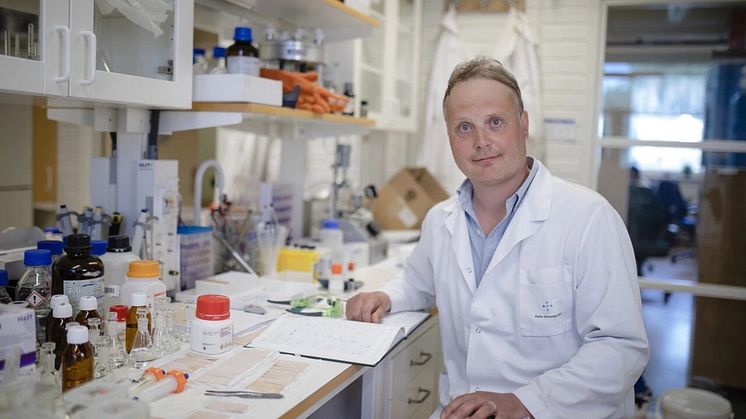
Press release -
New UBI Case Aims to Revolutionize Treatment of Cryptosporidiosis
Cryptosporidiosis is one of the biggest threats to newborn calves in the global agricultural industry. It is also responsible for hundreds of thousands of human deaths in developing countries each year.
There is currently no effective treatment for the disease, but a new case at Umeå Biotech Incubator is set to change that. Professor Christian Hedberg is developing a new drug with the potential to revolutionize the treatment of cryptosporidiosis worldwide.
Cryptosporidium is a zoonotic intestinal parasite that primarily infects ruminants such as cattle and sheep.
Around 30 percent of all calves in the global agricultural industry are affected by cryptosporidiosis in the first six weeks of their lives. In addition to causing discomfort to the animals, the infection can cause a 10-15 percent reduction in slaughter weight and delay milk production by three to four months.
There is currently no effective curative treatment for the parasitic disease for either animals or humans.
“Our goal is to create two different medicinal products to treat cryptosporidiosis based on ‘roughly’ the same molecule; a drug for ruminants (mainly newborn calves) and one for humans”, says Christian Hedberg, Professor at the Chemistry Department of Umeå University. He is now also working closely with Umeå Biotech Incubator (UBI) to bring the new treatment to market.
Collaborates with INRAE in France
Christian Hedberg collaborates with Fabrice Laurent, Head of Research at France's National Research Institute for Agriculture, Food and Environment, known as INRAE. The institute is the equivalent of the Swedish University of Agricultural Sciences - albeit several times larger - and is located in Tours, France. Fabrice has spent his entire career studying parasitic infections such as coccidiosis and cryptosporidiosis to decipher the immune response to such infections.
“Without Fabrice Laurent's expertise in cryptosporidium biology and access to facilities with biosecurity level 2 for large animals (to contain infections that could otherwise spread to animals and humans), we would never have been able to conduct this type of research. In addition to mouse models we have worked a lot with newborn lambs, which is experimentally demanding”, says Christian.
Both preventive and curative treatment
The new treatment targets a non-redundant, metabolic pathway in the parasite, and the team has achieved proof of concept in studies of a ruminant model using newborn lambs.
“The treatment is very effective and has an excellent safety index, with no signs of side effects. Our solution can be used both preventively, and as a curative treatment for an ongoing infection, which is what the agricultural industry wants”, says Christian, who continues:
“In many countries such as Sweden, cryptosporidiosis in calves remains untreated because there is no effective drug. There is only a reactive treatment - meaning farmers have to spend a lot of time and effort sanitizing their barns”.
Indications that the treatment works in humans
The symptoms of cryptosporidiosis are characterized by abdominal pain and diarrhea. The infection often spreads among people via contaminated drinking or pool water, but can also be transmitted from person to person, especially among children.
Sweden only records around 70-110 cases of cryptosporidiosis a year (with the notable exceptions of outbreaks in Östersund in 2010 and Skellefteå in 2011). The disease is usually not treated and subsides after a short period.
In developing countries in Africa and Southeast Asia, however, cryptosporidiosis is widespread and can be fatal, especially in young children. Approximately 130,000 children die each year from cryptosporidiosis before they reach their second birthday.
“The indications are that our treatment also works in humans. The road to market is considerably longer but the potential is enormous as this is a major problem for people in certain parts of the world”, concludes Christian.
CRYPTOSPORIDIOSIS FACTS
● 133,000 children aged 0-2 years die annually in developing countries. Around 7.5 million children between 0-2 years of age are affected annually.
● The DALYs (Disablility-Adjusted Life Years) measurement represents the total number of years lost globally due to poor health, disability or early death. Cryptosporidiosis is estimated to shorten global lifespan by 8.2 million years every year.
● Cryptosporidiosis causes more deaths and has a higher DALYs measurement than diseases such as dengue fever, yellow fever and rabies.
● Some 30 percent of all newborn calves in the global agricultural industry are affected by cryptosporidiosis during the first six weeks of their lives. This results in a 10-15 percent reduction in slaughter weight and a delay in milk production of three to four months.
Topics
Categories
Umeå Biotech Incubator

